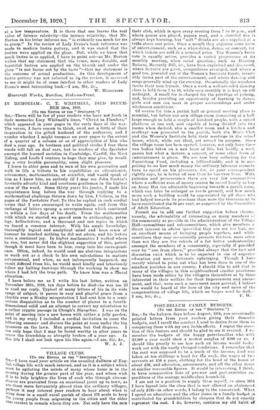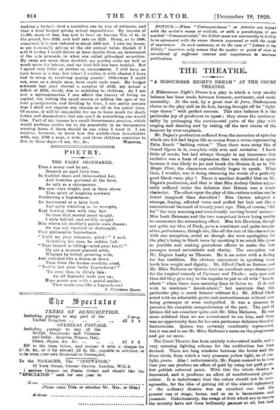POST-BELLUM FAMILY BUDGETS.
LTo THE EDITOR or THE " EFEHIATOH..] Sts,—In the halcyon days before August, 1914, you occasionally printed letters from your readers giving their domestic budgets, and I recall the comfort I used to derive from them in comparing them with my own feeble efforts. I regret the cessa- tion of this feature and should be glad to see It revived. I re- member the budgets of the happy paterfamilias who with £1,000 a year could show a modest surplus of £100 or so. I should like greatly to see how such an income would to-day work out with the vastly changed conditions. I remember that the rent was supposed to be a tenth of the income, food was taken at ten shillings a head for the week, the wages of two servants at £50 a year, clothing for the head of the house at about £30, and education, amusements, and all the other items at similar reasonable figures. It would be interesting, I think, to have comparative lists of pre-war and post-armistice ex- penditure of the average middle-class household. I am not in a position to supply these myself, es since 1914 I have lapsed into the class that is now allowed an abatement of only £135—in other words, I belong to the unmarried. What I spend on education and the other items in a family budget is contributed for grandchildren by cheques that do not exactly represent the cost. I do, however, continue my old habit of making a budget—first a tentative one by way of estimate, and then a final budget giving actual expenditure. My income of £1,000, more or lees, has now to bear an Income Tax of 6s. in the pound, less 2135, and half rate on £225. Being, as to 2600, unearned, it is now reduced to about £816 net. I own my house, so am nominally sitting at the old annual value, though if I sold it to-day I could derive at least double from an investment of the sale proceeds in what are called gilt-edged securities. My rates are more than doubled, my garden costs me half as much more for labour, and my food bill has been trebled. But I spend very little on clothes or amusements. I still keep an open house in a way, but (alas! I confess it with shame) I have bad to stoop to receiving paying guests! Otherwiee I could not, even as a single man, have made ends meet. My budget estimate last year showed a surplus of .6182, my actual a deficit of £213, chiefly due to subsidies to children. As I am now a septuagenarian I can afford the luxury of living on capital, for, taking the usual course of adding the ages of my four grandparents and dividing by four, I can safely assume that I shall not require any income at all in ten years' time. Of course, it will be impossible for me to leave much for death duties and descendants, but one can't do everything one would like. Part of my income is a small Government pension, which would perhaps enable me to die peacefully in an inexpensive nursing home if there should be one when I want it. I am curious, however, to learn how the middle-class householder with, say, £700 a year, a wife, and three children contrives to
live in these days.—I am, Sir, &c., Winowne.







































 Previous page
Previous page